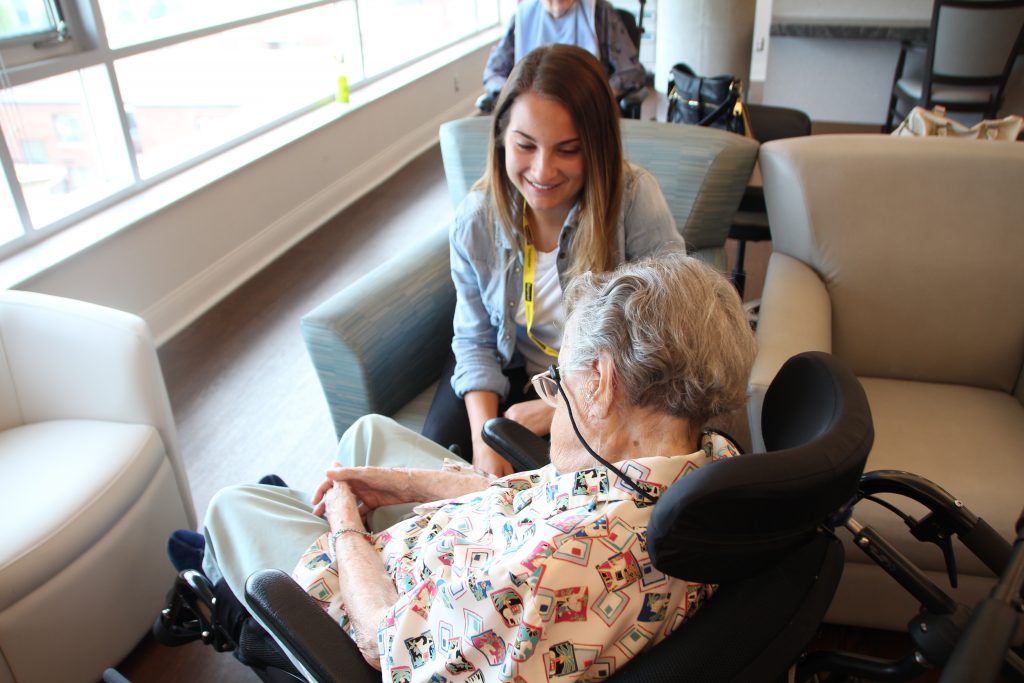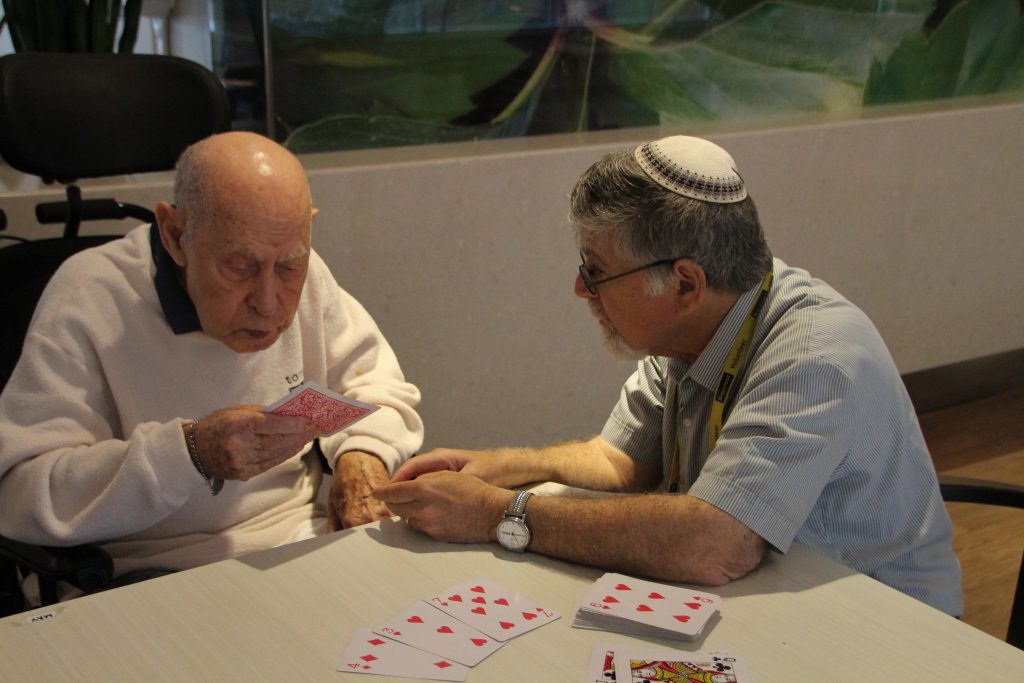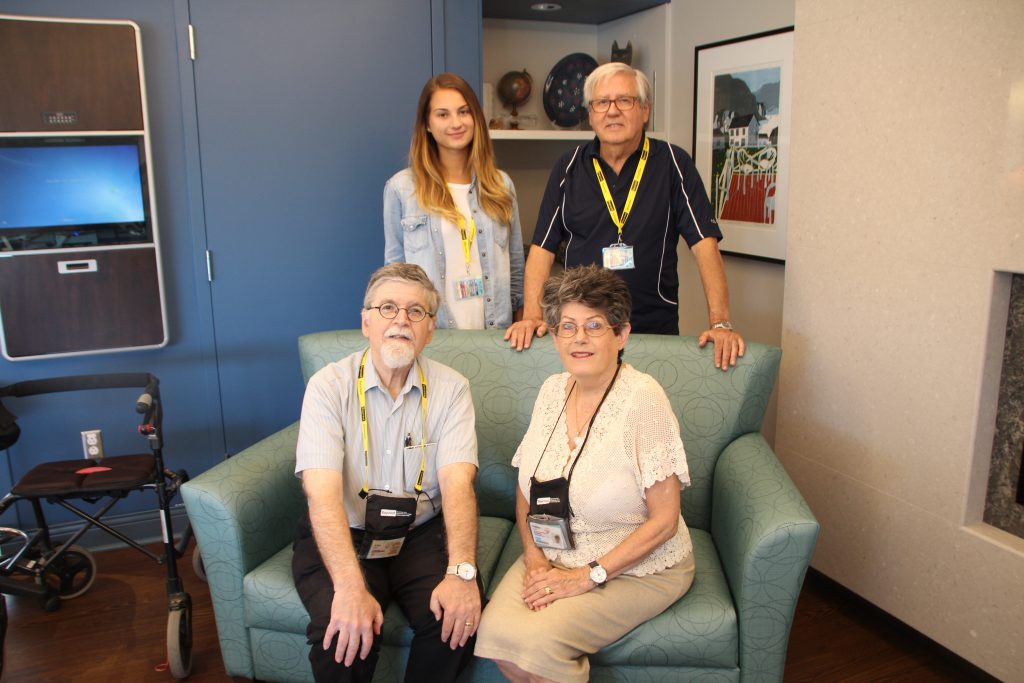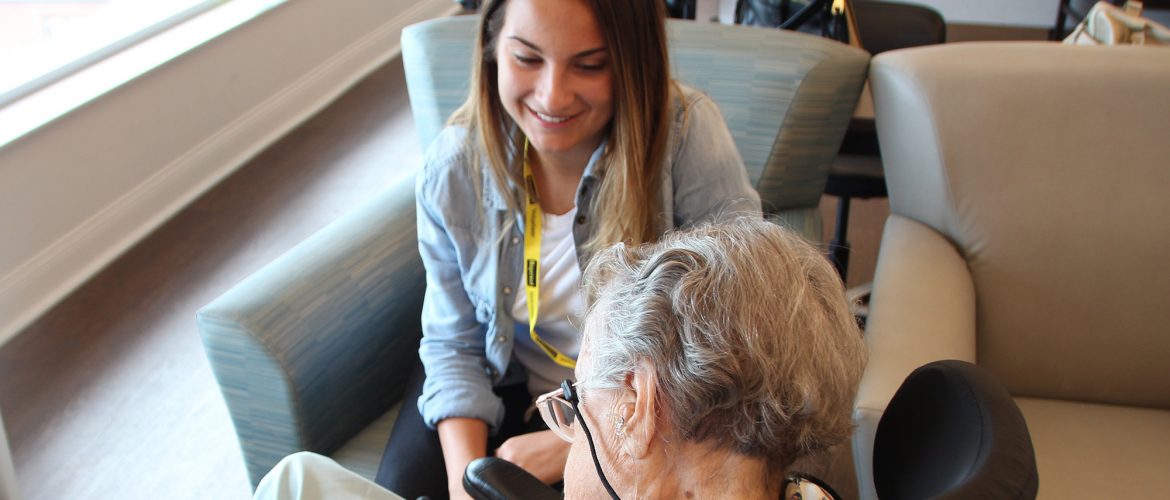“Give a person a fish and you feed them for a day. Teach a person to fish and you feed them for a lifetime.” What if we applied this age-old saying to a volunteer program? In a nutshell, that’s what the PLEASE Program is doing. The unique initiative provides specialized training for volunteers so that they can engage in meaningful activities with seniors living with severe cognitive impairment. With financial support from the Baycrest-led Centre for Aging + Brain Health Innovation (CABHI), a team of researchers at Baycrest is evaluating the innovative program’s effectiveness so that it can have a wider reach.
PLEASE stands for Programme for Leisure Engagement for Active and Spontaneous Experiences. The key is to offer residents choice, focus on strengths and provide meaningful one-on-one and group activities. “Essentially, it’s an incredible way to engage residents so that they’re in their own home doing the things that they love to do, with the people that they love to do it with – like you would want to do it in your own home,” shares Janis Sternhill, Baycrest’s director of volunteer services.

PLEASE volunteer Sabrina Teles interacts with a resident.
The interaction, however, goes beyond the traditional friendly visit. Volunteers are encouraged to bring their own skills and cater to the residents’ interests.
“Friendly visiting is absolutely important, but what we’re proposing is something a little different. In some cases, give these volunteers an extra set of skills and it’s amazing to see how they themselves flourish,” says Sylvia Davidson, manager, occupational therapy and therapeutic recreation, at Baycrest. “They bring out the best in the residents and there’s a sense of consistency – a level of recognition that often we wouldn’t think could happen with some of our residents anymore.”
Volunteers are encouraged to bring their own skill-set, whether it be music, painting, games, iPad-use – the possibilities are endless. They also complete an in-depth training session with therapeutic recreation professionals.
“In addition to the communication, responsive behaviours and eating assistance workshops, the training focuses on understanding and applying various principles – including person-centered care and quality of life in long-term care,” shares Baycrest recreation therapist Rachel Gavendo. “The training also stresses the importance of understanding and respecting a resident’s individuality, how to promote choice and independence. We also provide specific activity suggestions and techniques for approaching and engaging in activity with residents.”
Sabrina Teles, a volunteer with PLEASE since its inception, can attest to the program’s impact. “I’ve dabbled in other volunteer positions, but Baycrest has my heart. it’s just a totally different experience here being a part of the PLEASE Program because for a lot of these residents, this is their home. To be able to come into their home and really make a difference – and having them welcome you into their room or into their circle – that to me is the best part of the PLEASE Program.”

A volunteer plays cards with a Baycrest resident during a PLEASE Program session.
Sabrina sees first-hand the program’s positive impact on Baycrest residents. She shares an example of an older adult who was an artist for most of her adult life. Initially, the woman refused to work with Sabrina, who describes their first interactions as “rocky.”
“Through my interactions with her over the next few months, we ended up drawing a picture together. It became a really great experience because she refused to do anything art-related as she thought that was part of her past and it wasn’t something that she should be doing now. She always said she was ‘not good’ at what she used to do. The fact that we worked together and eventually I got her to draw a picture for me – and I have a few at home that she drew specifically for me – was incredible. That for me was a great coming-full-circle moment.”
Part of CABHI’s financial support is being used to evaluate the PLEASE Program. “For us to say it’s a great program, we have to have evidence to show that,” says research coordinator Anna Berall. The PLEASE Program is being evaluated by the Kunin-Lunenfeld Centre for Applied Research and Evaluation (KL-CARE) and includes research assistants, Karen Joseph, Sally Moy and Alix Noly-Gandon.

Volunteers Alan and Helen Cohen, Sabrina Teles and Barney Breslow.
The research team created observation tools to monitor engagement levels of residents while they participated in the PLEASE Program and during their daily routine. “We observed that the residents were engaged in playing games and activities, pointing towards books and reading and smiling with the volunteers –shares Anna. “Even residents that couldn’t participate could be a part of what was happening and have something to look at and listen to. We found there was a significant increase in the level of activity engagement and quality of life when residents were engaged with PLEASE volunteers.”
So far, there have been three phases of research. The current one looks at individual characteristics of residents over a 12-week period. The team will also be comparing these individual ratings to other volunteer-based programs.
“The literature talks about the importance of one-on-one and small group interactions in improving resident activity participation.” adds Anna. “But there’s very little literature on solutions and how do we actually make changes in long-term care that doesn’t impact resources.”
Through this CABHI-supported project, the KL-CARE team is on track to validate PLEASE as a viable and cost-effective solution for long-term care facilities. Down the road, the team hopes to develop a manual and web-based tools so that others in long-term care can benefit from this unique program.


